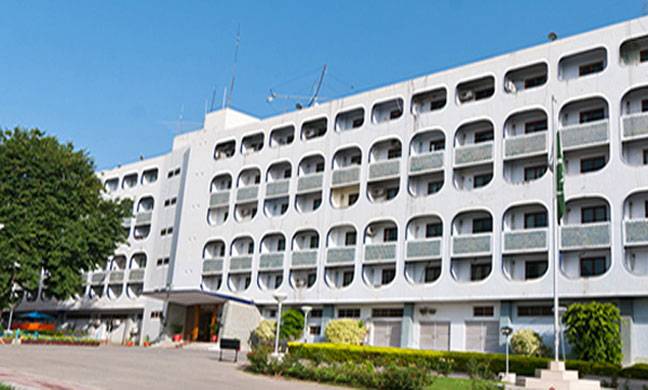ISLAMABAD - Pakistan on Sunday rejected Indian claim that its High Commissioner Ajay Bisaria was stopped from meeting the Sikh yatrees (pilgrims) who are in Pakistan to celebrate the Baisakhi festival.
Foreign Office spokesperson Dr Mohammed Faisal rejected as “baseless” Indian allegation that Bisaria was “prevented” from meeting the visiting Sikhs from India.
Responding to a news release issued by the Indian Ministry of External Affairs, Faisal said: “It is deeply regrettable that facts in this matter have been completely distorted and misrepresented.”
Tensions between Pakistan and India have been high since the killing of a Kashmiri freedom fighter Burhan Wani in July 2016.
An attack on Indian forces in September 2016, - that killed 19 soldiers in Uri area of held Kashmir - further heightened the tensions. India also claimed it had carried a “surgical strike” to avenge the Uri attack. Pakistan rejected the Indian claim.
This month, Pakistan and India agreed to resolve the issue of diplomats’ harassment under the 1992 Code of Conduct after the controversy intensified the tension.
The foreign ministry said Pakistan and India “have mutually agreed to resolve matters related to the treatment of diplomats and diplomatic premises in line with the 1992 ‘Code of Conduct’ for treatment of diplomatic/consular personnel in India and Pakistan.”
The two countries had accused each other of harassing and intimidating their diplomats and their families.
Foreign Office said Pakistani officials and their families were “facing intense harassment, intimidation and outright violence from the Indian state agencies.”
India, however, said that its diplomats posted to Islamabad had been facing similar harassment.
Amid the tension, Pakistan had recalled its High Commissioner to India Sohail Mehmood “for consultations”.
He was later sent back to New Delhi. The nuclear-armed neighbours have fought three wars since gaining independence from the British in 1947.
The two regularly trade allegations of harassment and espionage against diplomats.
Pakistan is active to de-escalate tension with India as Islamabad plans to host a group of Indian doctors to treat Indian prisoners detained here.
India had proposed that a group of 20 doctors be allowed a visit to Pakistan to examine women, children, elderly and mentally-unsound prisoners.
The two countries have already agreed for the release of these prisoners.
Dr Faisal said the factual position was that the secretary of the Evacuee Trust Property Board had extended an invitation to the high commissioner of India to attend the main function of Baisakhi and Khalsa Janamdin at the Gurdwara Panja Sahib on April 14.
“The Ministry of Foreign Affairs promptly processed the matter on April 13 and granted the travel permission. However, in the run-up to the main function, the ETPB authorities noticed strong resentment among segments of Sikh yatrees, gathered there from different parts of the world, protesting the release in India of some film on Baba Guru Nanak Devji,” the spokesperson said.
He added: “Considering an emotionally charged environment and the possibility of any untoward situation, the ETPB authorities contacted the Indian High Commission officials and suggested cancellation of the visit. The Indian High Commission officials, after due deliberation, conveyed back to ETPB their agreement to call off the visit in view of such a situation. The ETPB acted with sincerity and in good faith, and the cancellation took place with mutual understanding.”
Later in the day however, Faisal said, “the matter was raised with the Foreign Office in Islamabad and the Pakistan High Commission in New Delhi and a ‘protest’ was lodged. In response, the factual position was duly communicated to the Indian side, both in Islamabad and New Delhi. Despite that, we have seen that a wrongful version has been presented to mislead the public opinion.”
He said the “facts regarding visits of consular/protocol teams on April 12 and 14 had also been twisted.”
Faisal said: “The matter relating to the protocol teams’ access on the arrival of the Jatha at Wagah was expeditiously resolved through the intervention of the Ministry of Foreign Affairs. However, the concerned officials of the Indian High Commission chose not to return, even though they were duly notified that the requisite clearance has been granted. On 14 April, there was no scheduled meeting with pilgrims. Today (April 15) the officials of Indian High Commission have duly visited Gurdwara Punja Sahib.”
The spokesperson said: “We deeply regret this Indian attempt to generate controversy around the visits of Sikh pilgrims and to vitiate the environment of bilateral relations. For decades, Pakistan has made excellent arrangements to facilitate the visits of Sikh yatrees from across the world, including India, and extended protocol, reception, security, medical and other facilities. This is consistent with our religious ethos and traditions of hospitality.”
It is ironic for India, he said, “to accuse Pakistan of violating the 1974 Protocol on Visits to Religious Shrines, whereas it is the Indian government that has, in clear violation of the protocol, twice within this year denied visas to Pakistani pilgrims on occasions of Urs of Hazrat Nizamuddin Auliya (RA) and Khawaja Moinuddin Chishti Ajmeri (RA) and scuttled at least three visits of Sikh and Hindu pilgrims to religious shrines in Pakistan since June 2017.”
For its part, Faisal said, “Pakistan will continue to adhere to the 1974 Protocol, as is evident from our issuance of visas to over 2,000 Sikh yatrees from India. We hope that the Indian side would abide by the provisions of the protocol in letter and spirit.”
Over the weekend, Army Chief Gen Qamar Javed Bajwa said that the route to peaceful resolution of Pak-India disputes, including the core issue of Kashmir ran through comprehensive and meaningful dialogue.
“While such dialogue is no favour to any party, it remains the inevitable precursor to peace across the region. Pakistan remains committed to such a dialogue, but only on the basis of sovereign equality, dignity and honour,” he said, while addressing the military cadets in Kakul.
Pakistan foils Indian attempts to ruin Sikh pilgrims visit






